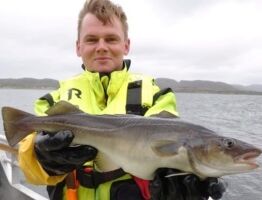正文
VOA慢速英语:挪威再次尝试在农场饲养濒危鱼类
Norway is relaunching an effort to farm cod in the North Atlantic.
An earlier effort to set up cod farms resulted with fish escaping and their failure to thrive in the cold icy waters. Norway hoped to become the first country to try large-scale breeding of a species that was decreasing in the wild.
A small group of companies raising Atlantic cod in Norwegian waters say they have learned from the success of the country's salmon business. They also say they have learned from the failure of earlier efforts to farm cod.

Wild Atlantic cod are having an uneven recovery. The number of cod living near Iceland and in the Barents Sea are considered sustainable. But those off Canada, the United States, Ireland and Britain are low. So are cod stocks in the Baltic Sea and other parts of the North Sea.
Norcod is the biggest of the new cod farms. It is raising 1.8 million fish along the Norwegian seacoast. The company plans to begin sales in 2021.
"We are targeting northern and western Europe first," said Christian Riber, Norcod's commercial director. He added that the company has also seen interest in their product from U.S. buyers.
Norcod aims to produce 6,500 tons in 2021, rising to 25,000 tons in 2025. That would be greater than the high reported in official records in 2010 before the industry collapsed.
There were many problems with Norway's earlier efforts to farm cod. "They used wild fish for breeding and the cod was escaping by biting into the nets," said Oeyvind Hansen. He heads the national cod breeding program at Nofima, the only research center that works with the selective breeding of cod.
Around half of all the fish raised in a pen died, Hansen noted. Growth rates were slow and the financial crisis of 2008 starved companies of credit. By 2015, the country produced no farmed cod at all.
What changed since the recent past?
But Nofima continued the research into cod breeding thanks to public spending from the Norwegian ministry of fisheries. The company has now bred five generations of farmed cod.
"Through selective breeding, the fish has adapted to farm life," said Hansen. "We have learned a lot about the biology and we have selected the fish best suited for fish farming."
Loss rates in the pens are down to about 15 percent. The fish do not eat each other as much, they grow faster and no longer try to escape, Hansen said. Norcod said its loss rates were much lower.
Norcod's Riber said the business is growing thanks to improvements in equipment from the salmon industry. Salmon farming has grown in 20 years into a $8-billion industry that exports 1.1 million tons of fish. Salmon fishing is now Norway's third-largest export after crude oil and natural gas.
Not everyone is pleased about the restart of cod farming.
"We have sustainable cod stocks in the wild in many areas in Norway that are thriving," said Arnold Haapnes. He heads the biodiversity program at environmental group Friends of the Earth Norway. "So why should we use (public) money to compete with the wild cod?"
Farmed salmon often escape during storms and mate with the wild salmon, he said. This causes introgression: the mixing of genes between wild fish and farm fish. Introgression lowers the amount of genes available in the wild population, he said. It also increases the effects of disease and environmental changes on the fish.
Norcod said it was able to prevent escapes, including in bad weather, by using the right equipment and with inspections of the nets to make sure there are no holes.
Fishing rights are a major issue within the European Union. Norway is not an EU member, however. The country negotiates limits and other issues with the group each year. It is also negotiating a trade deal with Britain — its biggest trading partner.
The Norwegian Seafood Council, a trade body, said Norway exported nearly 200,000 tons of cod, valued at $1.1 billion in 2018. The largest markets were Portugal, Britain and France.
"We need to produce more healthy seafood," said Fisheries Minister Odd Emil Ingebrigtsen, "And farmed cod can provide a regular source."
I'm Mario Ritter, Jr.
Gwladys Fouche reported this story for Reuters. Mario Ritter, Jr. adapted it for VOA Learning English. George Grow was the editor.




 手机网站
手机网站